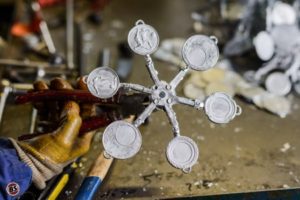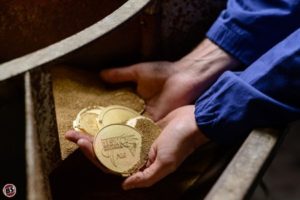MADE IN ITALY: A WEALTH OF KNOWLEDGE AND SKILLS

This brand label is symbolic of mastery in making things, which distinguishes Italians in the eyes of the rest of the world.
Even though the Italian system often struggles to communicate its strengths sufficiently, the made-in-Italy label really does offer added value when presenting Italian products abroad. As an Italian artisan, this is something I experience on a daily basis.
This label is synonymous worldwide with values such as high quality, originality, attention to detail and style, allowing Italian products to excel against international commercial competition.
It is of course widely known that Italians are lovers of good taste, and we like things done well. We are also a country of traditions and we pass on skills and knowledge to the future generations, which I believe is a distinctive and successful part of our way of working.
The Italian business network is made up of small and medium-sized enterprises, has a great deal of energy and really wants to make itself known. This is why the value of tradition, together with technological innovation, has taken the made-in-Italy label to the highly competitive global markets.
We have never been a patriotic nation, and here history really is only to be learned from, but I am convinced that in order to really make the most of the made-in-Italy idea, we need to be able depict the Italy made up of many different territories which all have different characteristics, flavours and stories to tell.
I recently read that the expression “made in Italy” used to have negative connotations; in the ‘60s it was a label given to Italian manufacturers by France and Germany, to single out products that had not been made in their own countries to their citizens.
But we are a nation that knows how to extract the good even out of something negative and today we can safely say that the opposite is true: Italian brands and products are highly regarded for their innovative design and quality materials.
Unfortunately, owing to a fall in turnover and periods of financial crisis, many Italian companies have delocalised their businesses over the years, sadly putting at risk those same high quality standards and our product identity.
The world and the markets have changed and “made in Italy”, now more than ever, needs to be protected against counterfeiting, unfair competition and false claims of origin.
I believe we need to protect our national heritage, working, as manufacturers, to respect the quality and design standards customers expect when buying a product that really has been made in Italy.
To conclude, “made in Italy” is more than just a label; it is a signature, a distinguishing feature that promotes the idea of a unique and special product.
It can still give us a competitive edge. I am increasingly of the idea that what matters is a country’s self-awareness, how it lives its own identity, and how it makes it known and turns it into a strength and a selling point.
This can only happen if we seriously believe in it, and if we invest in the real values behind Italian quality, with an eye to ethical considerations too, such as workers’ dignity, often disregarded in some emerging markets.
We are the ones responsible for ensuring Italy becomes more aware of its strengths and the resources it has available; this is how we can reap a higher reward.



